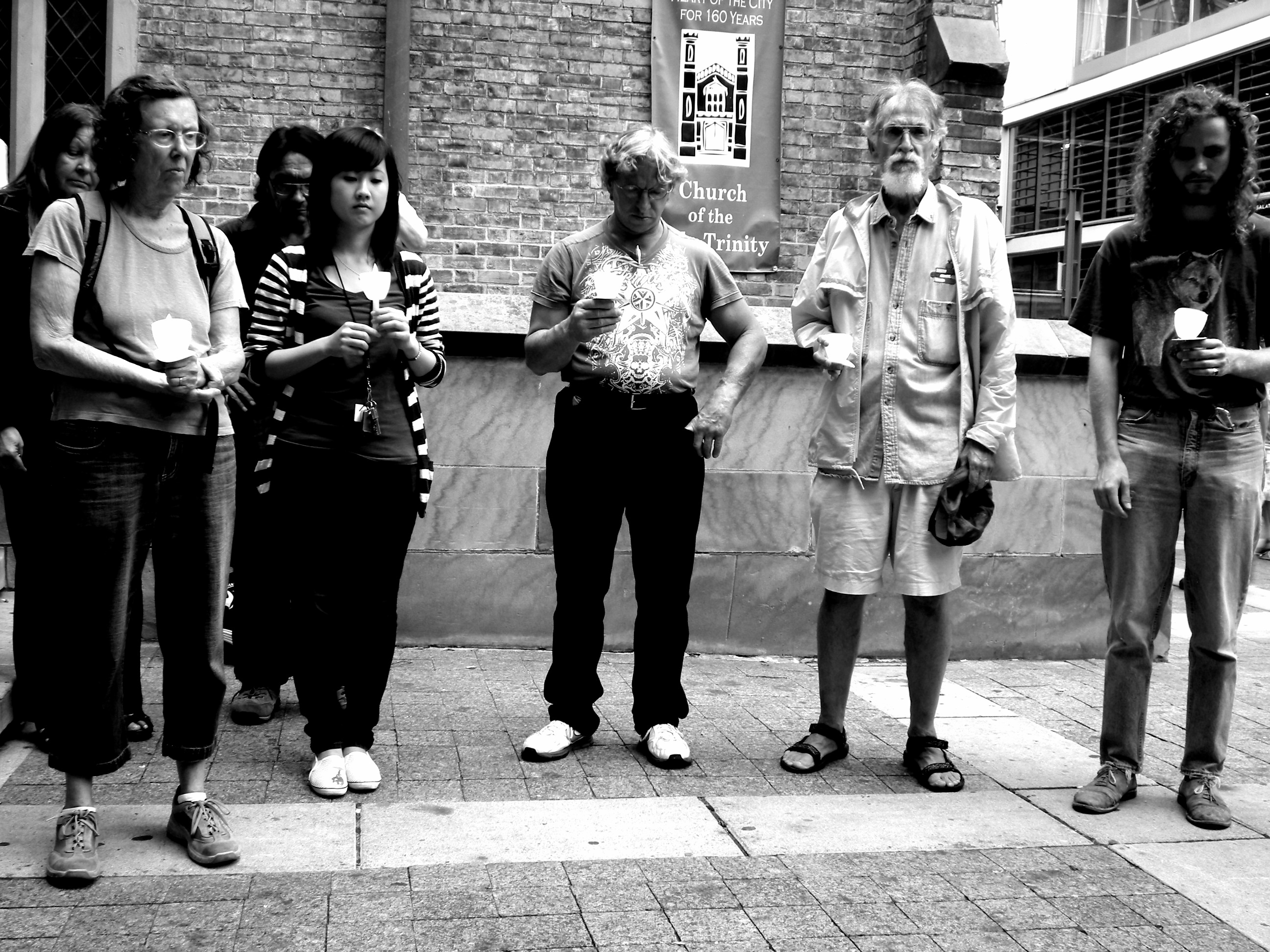The photo, featuring a yellow candle burning brightly, hung over the Toronto Homeless Memorial board as a symbol of hope that one day homeless deaths will be a thing of the past.
For now though, anti-poverty and housing activists continue to gather on the second Tuesday of every month to honour those who’ve died on the streets of Toronto the previous month.
Passersby were reflected in in the plexiglass cover of the Homeless Memorial Board that now contains the names of over 600 men, women and children.
On a cool August morning, people drifted in and out of the Church of the Holy Trinity, a sanctuary for homeless people that’s open six days a week.
Since the early part of the 20th century, the Church has been ministering to the needs of people in the inner city.
On Tuesday, the smoke from the barbecues rose high above the trees in the grassy area just south of the Church.
The corporate community hosted an event in support of the Daily Bread Food Bank to which no uninvited guests were allowed entry. Business people only. Not even the homeless people who sat on the benches a few yards away.
Those who work in the plush office buildings overlooking the Labyrinth dropped non-perishable food items into the drop boxes as they entered the restricted area.
The music blared out of the large black speakers, drowning out the conversation of the homeless couple scanning the list of names on the Memorial board.
The event was closed off to the public. Security personnel floated around the perimeter. Nine chefs sweated above the oversized grills.
Near noon, the lineup to get into the event stretched into the courtyard, almost reaching the entrance of the Eaton Centre.
The memorial candles were lit shortly after noon and handed out to a couple of dozen mourners, before one person who died in July was added to the board.
Her name was Cindy Foster.
For almost 10 years, Cindy was part of the community at Sanctuary Ministries, a church in downtown Toronto.
“She had this big, huge, curly red hair and a terrific laugh,” said Doug Johnson-Hatlem, a street pastor at Sanctuary.
“She had a very tough life living on the streets.”
After she’d been housed for four years, Cindy received an eviction notice nine days before she died of cancer in hospital.
“She wasn’t even there and she got evicted,” said Greg Cook, an outreach worker at Sanctuary.
“Which is often indicative of the nature of poverty and how precarious housing is.”
In addition to Cindy, two other names were added to the board. One died in October 2008; the other in November 2011.
After a moment of silence, housing activist Michael Shapcott stepped up to the microphone and announced a new national homelessness initiative called the Canadian Alliance to End Homelessness whose mission is to create a national movement to prevent and end homelessness in Canada through the development of 10 Year Plans to End Homelessness in communities across the country.
“We need to move from crisis responses (like shelters and soup kitchens) to solutions — permanent, appropriate, safe and affordable housing with the support necessary to sustain it,” wrote the Alliance on its website.
“We’ve had other national homelessness organizations over the years,” said Shapcott. “But groups have a life span and then they move on.”
Shapcott also mentioned that Sanctuary will be holding a meeting on Thursday, September 6 at 1 p.m. around the issue of social profiling of homeless people.
“Social profiling is a fancy term for the prejudice and discrimination that people who live on the streets experience because of their lack of housing,” he said.
“So we know that police treat homeless people differently than they treat people who are housed. We know that social services and many others treat homeless people differently than they treat people who are housed.”
In their forum on September 6, people are invited to talk publicly about social profiling and how to end it.
An hour before Tuesday’s memorial, Greg Cook said he witnessed a police officer issue a $65 ticket to a homeless person because he smelled Listerine on the man’s breath.
“I don’t know,” said Cook. “There may be a law about that but I haven’t heard that one before.”
While that police officer was writing up the ticket, Cook said he saw another officer allegedly rifling through a homeless man’s bag without a warrant.
“He was looking for the man’s medication, but didn’t ask permission to look through the bag,” he said.
“Then he threw it back down on the ground. Just really bullying and harassment in my opinion. And the gentlemen were just sitting there on the bench.”
Cook, who spends a great deal of time as an outreach worker walking the streets building relationships with homeless people, said it’s common practice for police officers to ticket or write notes on homeless people.
“Which is profiling,” said Cook. “Essentially, it criminalizes poverty.”
At the end of the memorial vigil, Sherman Hesslegrave, the minister at the Church of the Holy Trinity, invited everyone inside the church for lunch.
“I have no idea what they’re offering across the way,” he said.
“But it looks like that’s a ticketed event and ours is not. You’re all welcome.”



